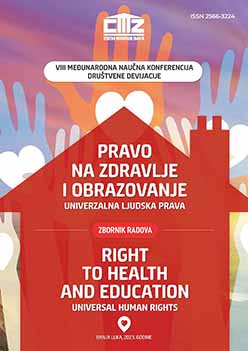LJUDSKA PRAVA U REPUBLICI HRVATSKOJ, PRIJE I NAKON ULASKA U EUROPSKU UNIJU
HUMAN RIGHTS IN THE REPUBLIC OF CROATIA,
BEFORE AND AFTER ENTRY INTO THE EUROPEAN UNION
Author(s): Branko Peran, Mirko Goreta, Vedran MilkovićSubject(s): Social Sciences, Law, Constitution, Jurisprudence, Human Rights and Humanitarian Law, Sociology
Published by: CENTAR MODERNIH ZNANJA
Keywords: human rights; protection of human rights; European Union; Constitution of the Republic of Croatia; European Court; European Ombudsman;
Summary/Abstract: The most important source of human rights in the Republic of Croatia, which is a member of the European Union, is the Constitution of the Republic of Croatia. All human beings are born equal in rights and dignity. They are endowed with reason and awareness, so they should treat each other in the spirit of brotherhood. Human rights are the innate rights of all people, men, women and children, because they are human beings, and human rights are universal because they belong to every human being equally, without discrimination on any basis, regardless of gender, race, color, language , religion, political and other opinion, national or social origin, association with a national minority, property, birth or long status. In addition, they are indivisible, of equal importance and mutually dependent. Similarly, human rights are inalienable, they are inseparable from the individual, they are a condition for freedom, peace and justice in the world, and the fundamental goal of respecting and protecting human rights is human dignity. Furthermore, human rights can be defined as universal rights of a fundamental nature that belong to every person in their relationship with the state. In the European Union, there are two main directions of policy and action in the field of human rights. One is the protection of fundamental human rights for EU citizens, and the other is the promotion of human rights worldwide. In the early days of the European Union, the awareness of the need to protect human rights was not sufficiently developed because it was an organization of an economic nature, and it was also considered that such rights would be taken care of by the Council of Europe. With the expansion of the competences of the European Union, there was a need for additional regulation and protection of human rights, so the accession of the Union to the European Convention for the Protection of Human Rights became mandatory with the Treaty of Lisbon. The European Convention for the Protection of Human Rights represents the mechanism of external supervision over the protection of human rights in the EU, and in parallel with it, the mechanism of internal supervision over the protection of human rights was established by means of the EU Charter on Fundamental Rights. In the Republic of Croatia, the human rights of every individual are prescribed by the Constitution of the Republic of Croatia, international treaties to which the Republic of Croatia is a party, and many laws.
Journal: DRUŠTVENE DEVIJACIJE
- Issue Year: VIII/2023
- Issue No: 8
- Page Range: 215-221
- Page Count: 7
- Language: Bosnian, Croatian, Serbian

